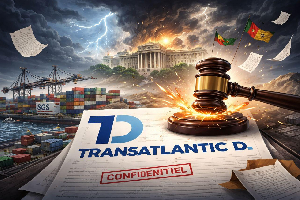In the introduction to the fourth chapter of my book: THE ANGLOPHONE SOUL, I did make reference to the Buea Declaration of 2nd and 3rd April, 1993 enacted by the All Anglophone Conference which spelt out very clearly, the horrors of the people of Southern Cameroons and their frustrated dream of establishing a unique federation on the continent of Africa and to evolve a bi-cultural society, on which the distinct heritages of the partners in the union will flourish.
I also asked the pertinent question: What must be done in the face of such frustration in a lofty mission, such as was envisaged by the Anglophones? Also in the fifth Chapter of the same book, I felt that there was no doubt that the Buea Declaration, which stood as the blue-print of AAC (1), constituted a complete documentation of the Anglophones, and succeeded in exposing all those who have persistently argued that there is no Anglophone problem.
But the greatest doubt in the minds of most devoted Anglophones was centered on where all these brilliant exposes have landed the Anglophone case.
This was precisely the doubt that generated the feeling that the two AAC’s have to be substituted by a more constitutional forum, to act as a legitimate body charged with the responsibility of acting and speaking on behalf of the entire Anglophone people, who discovered their future to be hanging on the balance, and this is how the National Council of Southern Cameroons came into being.
However, whether the SCNC, in the past two decades has achieved anything that comes close to the aspiration of those who confided in them the powers to act on their behalf, is in itself still a big question.
All that is evident is their untiring efforts to knock on the doors of international organizations, such as the United Nations, the European Union, and of late, the Banjul Court which only advised the movement to transform into a political party, a proposal which fits so well in the wishes of the regime.
It will only add to the hundreds of registered and to a greater extent, inactive parties, that exist only on paper.
At best the United Nations simply advised them to dialogue with the government.
At worst such an advice will only send the SCNC playing into the hands of the regime, which persists in its argument, that they do not know who to talk to, because the SCNC, in the estimation of the regime is an illegal organization.
The latest sad news of the passing away of Chief Ayamba, who succeeded Dr. Martin Ngeka Luma who died in 2003, may seem to many as a major blow to the movement, but to others, it’s an act of God, intended to reinforce the unity of the movement.
For most part of the more than one decade that Chief Ayamba was the National Chairman of the SCNC, the relationship between him and his deputy, Nfor Ngalla Nfor, were not practicably smooth, leading to Nfor Ngalla seemingly leading another faction of the SCNC. This development only served the regime in oiling its machine in frustrating the SCNC.
To a point the frustration had ran right down the nerves of the association, virtually reducing it to an agent of asylum seekers and addicted to the act of planting flags on certain strategic positions simply as a mark of their presence on the field.
One argument the regime seems to hang on so much is that the option for secession is not a popular one that comes from the thinking of a majority of Anglophones.
For instance, before the two All Anglophone Conferences, dark clouds were already gathering among Anglophones, about their future in the new political dispensation which ushered in the multiparty system.
Anglophones had already become suspicious of the regime’s faith in accepting multiparty, which was only forced on it. This skepticism finally led to the formation of the Cameroon Anglophone Movement CAM, whose president was Ambassador Epie Kwoge Martin. This was the first organized body that rallied Anglophones towards the option of secession.
Ambassador Epie’s vision was that, at that crucial moment, Southern Cameroonians should strive not to place Fru Ndi, who at the time was a presidential candidate for the SDF, at the helm of the state of La Republic du Cameroun, but to use him to restore the sovereignty of the Southern Cameroons.
To make his case even stronger, Ambassador Epie implored Southern Cameroonians to first of all fight for their political and economic emancipation, and to avoid embarking on a venture which was of little concern to them.
The ultimate results of the 1992 presidential elections, which showed that Fru Ndi, an Anglophone candidate, was widely believed to have won the elections but which it is equally widely believed that the results were capsized, showed very clearly that it is only an Anglophone who could reverse the status quo.
A second option to the Anglophone argument is the return of federalism based on the two-state structure. The extreme option of secession has simply been forced on the Anglophones through the regime’s intransigence.
The SCNC should therefore use the passing away of Chief Ayamba to consolidate the unity of the Anglophones. The movement has suffered in-fighting in the leadership for long.
One of Chief Ayamba’s weaknesses was that he had the secret ambition to be the first president of the dream Anglophone nation of Southern Cameroons. By this, he shunned any democratic option for elections leading to a consensus in the choice of a leader.
May he rest in peace. He certainly has a legacy that will immortalize him.
Opinions of Friday, 27 June 2014
Auteur: thesuncameroon.com














